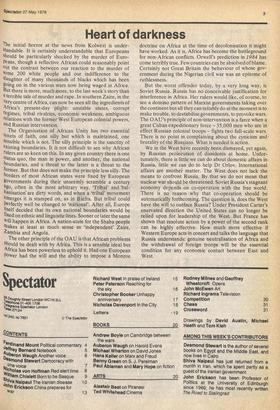Heart of darkness
The initial horror at the news from Kolwezi is understandable. It is certainly understandable that Europeans Should be particularly shocked by the murder of Euro Peans, though a reflective African could reasonably point out the contrast between our reaction to the murder of some 200 white people and our indifference to the slaughter of many thousands of blacks which has been going on in the various wars now being waged in Africa. But there is more, much more, to the last week's story than a terrible tale of murder and rape. In southern Zaire, in the very centre of Africa, can now be seen all the ingredients of Africa's present-day plight: unstable states, corrupt regimes, tribal rivalries, economic weakness, ambiguous relations with the former West European colonial powers, and Russian intervention.
The Organisation of African Unity has two essential tenets of faith, one silly but which is maintained, one sensible which is not. The silly principle is the sanctity of existing boundaries. It is not difficult to see why African rulers are so keen on this. In any given country there is one status quo, the man in power, and another, the national boundaries, and a threat to the latter is a threat to the former. But that does not make the principle less silly. The borders of most African states were fixed by European governments during their unseemly scramble a century ,ago, often in the most arbitrary way. 'Tribal' and 'balkanisation' are dirty words, and when a 'tribal' movement emerges it is stamped on, as in Biafra. But tribal could perfectly well be changed to 'national'. After all, Europe itself decided that its own national boundaries would be fixed on ethnic and linguistic lines. Sooner or later the same Will happen in Africa. A nation-state for the Shaba people makes at least as much sense as 'independent' Zaire, Zambia and Angola. The other principle of the OAU is that African problems Should be dealt with by Africa. This is a sensible ideal but Africa has been powerless to uphold it. Had one European Power had the will and the ability to impose a Monroe doctrine on Africa at the time of decolonisation it might have worked. As it is, Africa has become the battleground for non-African conflicts. Orwell's prediction in 1984 has come terribly true. Few countries can be absolved of blame. Certainly not Great Britain the behaviour of whose government during the Nigerian civil war was an epitome of ruthlessness.
But the worst offender today, by a very long way, is Soviet Russia. Russia has no conceivable justification for interference in Africa. Her rulers would like, of course, to see a domino pattern of Marxist governments taking over the continent but all they can reliably do at the moment is to make trouble, to destabilise governments, to provoke wars. The OAU's principle of non-intervention is a farce when a great Cuban expeditionary force — 35,000 men who are in effect Russian colonial troops — fights two full-scale wars. There is no point in complaining about the cynicism and brutality of the Russians. What is needed is action.
We in the West have recently been dismayed, yet again, by Russian persecution of dissidents at home. Unfortunately, there is little we can do about domestic affairs in Russia, little we can do to help Dr Orlov. International affairs are anotheimatter. The West does not lack the means to confront Russia. By that we do not mean that nuclear war should be threatened. Soviet Russia's stagnant economy depends on co-operation with the free world. There is no reason why that co-operation should be automatically forthcoming. The question is, does the West have the will to outface Russia? Under President Carter's enervated direction the United States can no longer be relied upon for leadership of the West. But France has shown that resolute action by a power of the second rank can be highly effective. How much more effective if Western Europe acts in concert and talks the language that Russia understands: genuine neutralisation of Africa and the withdrawal of foreign troops will be the essential condition for any economic contact between East and West.


































 Previous page
Previous page